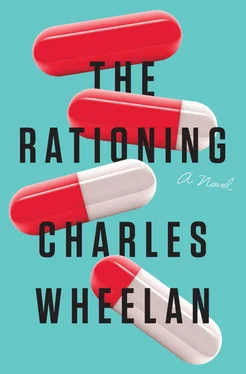LIONEL GISCARD ARRIVED AT THE NIH OFFICES WITH GREAT fanfare. He had long gray hair and a carefully manicured goatee. He wore a blue suit with a florid purple shirt and a paisley silk scarf around his neck that he wrapped and unwrapped frequently, almost like a nervous tic. Giscard was stylish for a fifty-year-old man; by NIH standards he looked like a fashion model (with a great accent). Giscard’s arrival caused a frisson of excitement. Those who knew him greeted him effusively. Others waited to be introduced. I was surprised by how all the charges of bad behavior melted away in his presence—scientific celebrity. I also recognized that celebrity can be relative. As soon as Giscard stepped out of our scientific den onto the street, he became just another old guy with a goofy-looking scarf.
The NIH Director ushered Giscard into a conference room, where the Capellaviridae team was assembling. I was seated at the table; the Director introduced me as the resident Capellaviridae expert. “Okay, yes,” Giscard said. “But I am not familiar with your work. You publish on Capellaviridae , yes?”
“I did my doctoral work on it,” I said.
“And since?”
“I work on the staff here.”
“Ah, yes, I see.” His tone could not have been more dismissive. He immediately turned and looked around the room. His gaze settled on Jenna, who was seated in the back of the room in one of the chairs reserved for junior staff.
“Good to meet you,” I said sarcastically as Giscard made a beeline for Jenna, like a wolf that has spotted a baby rabbit limping in the grass. From across the room I watched as Giscard shook Jenna’s hand, placing his other hand lightly on her arm. She laughed at something he said. Some of the senior scientists waited patiently to meet Giscard while he finished his flirtation.
The NIH Director called the room to order. She introduced Giscard to the senior staff and gave a brief overview of our progress to date, including a summary of my “hostage hypothesis.” “But of course,” Giscard said. “This makes perfect sense. I have been working on a paper to this effect. In French, we say ‘preneur d’otages,’ the taker of hostages.” Like so much else with Giscard, it is hard to know if this was the truth, an exaggeration, or a complete falsehood. He claimed he was working on a paper with a theory of lurking viruses similar to what I had proposed. “You were invited to the conference in Toronto, yes?” he asked me.
“I wasn’t able to attend,” I said. That was technically true. If one is not invited, it is difficult to attend. Also, I had no idea what Toronto conference he was referring to.
When the Director finished her briefing, the room fell silent. All eyes turned to Giscard for some pearl of wisdom. He swept the paisley scarf around his neck with even more care than usual. “Mais oui,” he said, drawing the attention of the few people in the room who had not been looking at him. He struck a pensive tone, deliberately unfurling the scarf. At last: “I think that if a vector can spread a virus, then it can also spread an antibody, yes?” He had a prodigious ability to appear profound while repeating what he had just been told.
“That is the hypothesis we are now exploring,” the Director said.
“By this thinking, the small bug—how does one say it?”
“The North American dust mite,” the Director offered.
“Yes, the dust mite. The dust mite becomes valuable to its host, the human, because it somehow introduces the antidote for Capellaviridae. Yes?”
A scientist at the conference table interjected, “We’ve not found any sign of an antibody. That was one of the first things we checked for. We cannot find any antibodies in those who are not affected—”
“Yes, yes, okay,” Giscard said, cutting him off and, at least from my perspective, dismissing him with what looked like a wave of the scarf. “I assume as much, or I would not be here. This is not your typical potato, right?” Remarkably, people throughout the room, including most of the senior scientists, laughed at this bizarre potato comment. Giscard continued, “But somehow the ongoing presence of this small bug—”
“The dust mite,” a scientist sitting opposite Giscard offered.
“Yes, okay, the presence of the dust mite is somehow affecting Capellaviridae so it does not turn dangerous.”
Tie Guy, who was sitting in a chair against the wall, interjected confidently, “We have nothing to show causality here—no biological evidence whatsoever—just a robust inverse correlation. When people are exposed constantly to the dust mite, they do not get sick. When that exposure is interrupted, either because the dust mite is successfully exterminated, or because a person moves to an area where there are no dust mites, Capellaviridae is prone to turn virulent.”
“Yes, yes, like the Director said,” Giscard agreed. “And when you expose people who are sick with Capellaviridae to the dust bug, they get better?”
“It’s been very hard to test,” I offered. “Most people get better on their own, so we’d need a huge trial to prove effectiveness. We don’t have the time and we don’t have the volunteers.”
Giscard gave the scarf one final furl around his neck. He leaned back in his chair and put his fingertips together, making sure that the whole room recognized that he was now engaged in deep contemplation. “And so here we are,” he said.
“This is where we’ve been since I proposed the hypothesis,” I said with more than a little irritation.
“Can we break for a coffee?” Giscard asked. “I think this situation is very manageable.”
“It’s not feeling manageable,” the Director said. “We have very little time.”
“Let’s have a coffee,” Giscard insisted. “I have some ideas.” The Director was nonplussed at having the meeting interrupted for a coffee break. (There were urns of coffee in the conference room.) Giscard was disrupting the protocol: reports to be presented, assignments to be made, and so on. The guy had no official role, and now here he was proposing a coffee break eighteen minutes into our official daily briefing.
“We have a lot of business to get through,” the NIH Director said.
Giscard waved dismissively at the crowded conference table. “But this is not how science happens, with bureaucratic meetings. We need to think—how do you say it, brainstorm. We do not need the accountants in the room.” Obviously there were no accountants in the room, and Giscard had now managed to annoy much of the staff, but he was not entirely wrong. The NIH meetings had become increasingly mechanistic and process-oriented. The time spent in meetings like this drowned out some of the casual conversations among researchers that could often lead to breakthroughs.
“We have some important things to get through,” the Director said. “Then perhaps we can do a smaller session a little later with no agenda. Please understand that we are keen to take advantage of your expertise, Dr. Giscard.”
“As you like,” Giscard said with a twirl of the scarf. “I am here because there is a crisis.”
The Director moved through business quickly, after which a group of us on the science side retired to a small windowless conference room with whiteboards on three walls. As we filed into the room, Giscard spotted Jenna speaking with the Director. Once again, he made a beeline for her. “Will that room be okay, Dr. Giscard?” the Director asked as he approached.
“Yes, yes,” he assured her as he turned to Jenna. “But you will join us?”
“Me?” Jenna asked, apparently oblivious to the fact that Giscard was stalking her. “I’m just an extra pair of hands around here.”
Читать дальше












